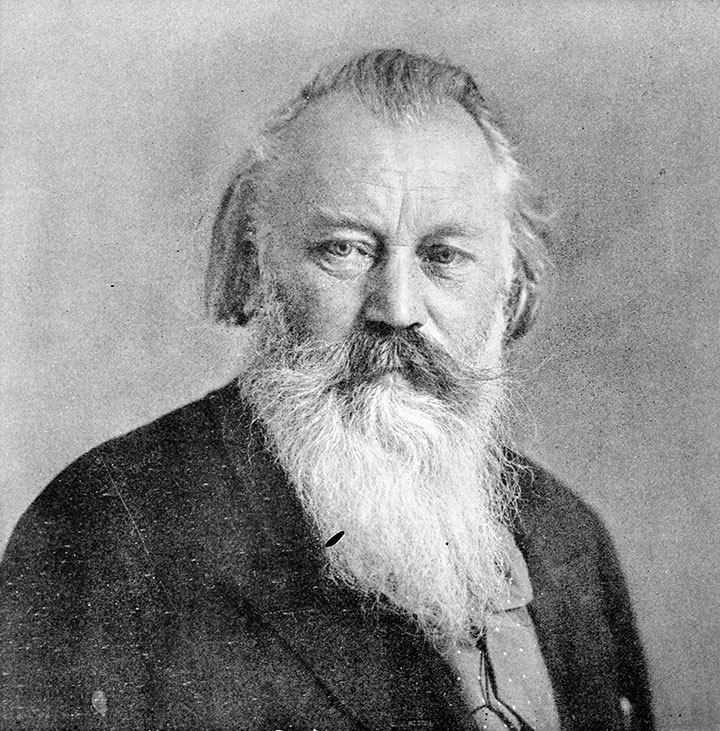
German composer known for his Variations on a Theme of Haydn, German Requiem, sonatas for piano, and a multitude of other works. Colloquially referred to as one of the Three B's (the others being Bach and Beethoven) who occupy the pantheon of musical greatness.
Johannes Brahms, born on May 7, 1833, in Hamburg, Germany, was one of the most significant composers of the Romantic period. His work is often celebrated for its profound emotional depth, structural mastery, and synthesis of classical forms with Romantic expressiveness. Brahms’s music spans a wide range of genres, including symphonies, concertos, chamber music, piano works, choral compositions, and more. His legacy endures, and he is often grouped with Johann Sebastian Bach and Ludwig van Beethoven as one of the "Three Bs" of classical music.
Brahms was born into a modest family; his father, Johann Jakob Brahms, was a double bassist, and his mother, Johanna Henrika Christiane Nissen, was a seamstress. From an early age, Brahms showed a remarkable aptitude for music. He began playing the piano at the age of seven and quickly progressed, displaying a talent that belied his young age. His early education in music was rigorous, with Brahms often practicing under the guidance of his father and various teachers. Despite the family's financial struggles, Brahms received a solid musical education, and by his teens, he was already performing as a pianist in local taverns to contribute to the family income.
Brahms's early career was shaped significantly by his meeting with the Hungarian violinist Eduard Reményi in 1850. Through Reményi, Brahms was introduced to Hungarian folk music, which would later influence some of his compositions. More importantly, in 1853, Reményi introduced Brahms to the famous violinist Joseph Joachim, who became a lifelong friend and collaborator. Joachim, in turn, introduced Brahms to the influential composer Robert Schumann and his wife, the pianist Clara Schumann.
The Schumanns played a crucial role in Brahms's life and career. Robert Schumann was deeply impressed by Brahms's talent and wrote an article in the Neue Zeitschrift für Musik, hailing Brahms as a genius and the future of German music. This endorsement brought Brahms immediate attention, but it also placed enormous pressure on him to live up to such high expectations. After Robert Schumann’s mental health declined and he was institutionalized, Brahms grew closer to Clara Schumann, developing a deep, complex relationship that lasted until Clara’s death in 1896.
Brahms’s musical style is known for its meticulous craftsmanship, classical structures, and a deep sense of emotion. He often drew inspiration from earlier composers like Bach, Beethoven, and Schubert, blending their influences with his own Romantic sensibilities. His four symphonies, in particular, are revered for their complexity, cohesion, and emotional power. The First Symphony, which took Brahms over 14 years to complete, is sometimes referred to as "Beethoven’s Tenth" because of its perceived connection to Beethoven’s symphonic legacy.
In addition to his symphonies, Brahms made significant contributions to the chamber music repertoire. Works like his Piano Quintet in F minor, the Violin Concerto in D major, and the Clarinet Quintet in B minor are staples of the chamber music canon. His piano works, such as the late piano intermezzi and the Hungarian Dances, showcase his ability to blend lyrical melodies with intricate structures.
Despite his immense success, Brahms remained a private and introspective individual throughout his life. He never married, and his personal life was often shrouded in mystery. He was known for his self-critical nature, which led him to destroy many of his early works. Brahms spent the later years of his life in Vienna, where he continued to compose and remained an influential figure in the musical community.
Johannes Brahms passed away on April 3, 1897, at the age of 63. His music continues to be celebrated for its emotional depth, technical brilliance, and its ability to convey the complexities of the human experience. Brahms's work remains a cornerstone of classical music, embodying the pinnacle of the Romantic era’s artistic achievements.
 >
>